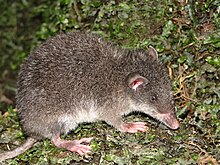| Paucituberculata Temporal range: Late Paleocene (Itaboraian)-Recent ~58.7–0 Ma PreꞒ Ꞓ O S D C P T J K Pg N | |
|---|---|

| |
| Caenolestes sangay | |
| Scientific classification | |
| Domain: | Eukaryota |
| Kingdom: | Animalia |
| Phylum: | Chordata |
| Class: | Mammalia |
| Clade: | Marsupialiformes |
| Infraclass: | Marsupialia |
| Order: | Paucituberculata Ameghino, 1894 |
| Suborders | |
| |
| Diversity | |
| 7 extant species | |
| Synonyms | |
| |
Paucituberculata /ˌpɔːsɪtjuːˌbɜːrkjuːˈleɪtə/ is an order of South American marsupials. Although currently represented only by the seven living species of shrew opossums, this order was formerly much more diverse, with more than 60 extinct species named from the fossil record, particularly from the late Oligocene to early Miocene epochs. The earliest paucituberculatans date to the late Paleocene (Itaboraian South American land mammal age). The group went through a pronounced decline in the middle Miocene epoch, which resulted in the extinction of all families of this order except for the living shrew opossums (Caenolestidae). Extinct families of Paucituberculatans include Pichipilidae, Palaeothentidae, and Abderitidae.
Classification
It is one of two clades of Ameridelphia, a paraphyletic group; genetic studies have shown these animals to be a sister group to Australidelphia (i.e., Didelphimorphia branched off first).
The Paucituberculata were once considered to be closely related to South American polydolopimorph metatherians, however phylogenetic analyses have found this is not true.
Subdivision
The order is subdivided into:
| Phylogeny of Paucituberculata | ||||||||||||||||||||||||||||||||||||||||||||||||||||||||||||||||||||||||||||||||||||||||||||||||||||||||||||||||||||||||||||||||||||||||||||||||||||||||||||
|
- †Bardalestes Goin et al. 2009
- †Evolestes Goin et al. 2007
- †Fieratherium Forasiepi et al. 2013
- †Riolestes Goin et al. 2009
- Superfamily Caenolestoidea Trouessart 1898
- Family Caenolestidae Trouessart 1898
- Caenolestes Thomas 1895
- †Caenolestoides Arbello, Martin & Cardoso 2021
- †Gaimanlestes Arbello, Martin & Cardoso 2021
- Lestoros Oehser 1934
- †Pliolestes Reig 1955
- †Pseudhalmarhiphus Ameghino 1903
- Rhyncholestes Osgood 1924
- †Stilotherium Ameghino 1887
- Family Caenolestidae Trouessart 1898
- Superfamily †Palaeothentoidea Goin et al. 2009
- †Perulestes Goin & Candela 2004
- †Pilchenia Ameghino 1903
- †Sasawatsu Goin & Candela 2004
- Family †Pichipilidae Marshall 1980
- †Phonocdromus Ameghino 1894
- †Pichipilus Ameghino 1890
- †Quirogalestes Goin & Candela 1998
- Family †Abderitidae Ameghino 1889
- †Abderites Ameghino 1887
- †Parabderites Ameghino 1902
- †Pitheculites Ameghino 1902
- Family †Palaeothentidae Sinclair 1906
- †Chimeralestes Engelman et al. 2017
- †Hondathentes Dumont & Brown 1997
- Subfamily †Palaeothentinae Sinclair 1906
- †Antawallathentes Rincón et al. 2015
- †Carlothentes Bown & Fleagle 1993
- †Palaeothentes Ameghino 1887
- †Palaepanorthus Ameghino 1902
- †Propalaeothentes Bown & Fleagle 1993
- Subfamily †Acdestinae Bown & Fleagle 1993
- †Acdestis Ameghino 1887
- †Acdestoides Bown & Fleagle 1993
- †Acdestodon Bown & Fleagle 1993
- †Titanothentes Rae, Bown & Fleagle 1996
- †Trelewthentes Bown & Fleagle 1993
See also
References
- Abello, María A. (2013). "Analysis of dental homologies and phylogeny of Paucituberculata (Mammalia: Marsupialia)". Biological Journal of the Linnean Society. 109 (2): 441–465. doi:10.1111/bij.12048. hdl:11336/13571.
- ^ Engelman, Russell K.; Anaya, Federico; Croft, Darin A. (2017). "New palaeothentid marsupials (Paucituberculata) from the middle Miocene of Quebrada Honda, Bolivia and their implications for the palaeoecology, decline, and extinction of the Palaeothentoidea". Journal of Systematic Palaeontology. 15 (10): 787–820. doi:10.1080/14772019.2016.1240112. S2CID 88758358.
- ^ Goin, Francisco J.; Candela, Adriana M.; Abello, M. Alejandra; Oliveira, Edison V. (2009). "Earliest South American paucituberculatans and their significance in the understanding of 'pseudodiprotodont' marsupial radiations". Zoological Journal of the Linnean Society. 155 (4): 867–884. doi:10.1111/j.1096-3642.2008.00471.x.
- Schiewe, Jessie (2010-07-28). "Australia's marsupials originated in what is now South America, study says". Los Angeles Times. Archived from the original on 1 August 2010. Retrieved 2010-08-01.
- Nilsson, M. A.; Churakov, G.; Sommer, M.; Van Tran, N.; Zemann, A.; Brosius, J.; Schmitz, J. (2010-07-27). "Tracking Marsupial Evolution Using Archaic Genomic Retroposon Insertions". PLOS Biology. 8 (7): e1000436. doi:10.1371/journal.pbio.1000436. PMC 2910653. PMID 20668664.
- Abello, 2007, p.410
- Paucituberculata at Fossilworks.org
- Alejandra Abello, María; Martin, Gabriel M.; Cardoso, Yamila (2021). "Review of the extinct 'shrew-opossums' (Marsupialia: Caenolestidae), with descriptions of two new genera and three new species from the Early Miocene of southern South America". Zoological Journal of the Linnean Society. 193 (2): 464–498. doi:10.1093/zoolinnean/zlaa165.
- Abello, María Alejandra; Toledo, Nestor; Ortiz-Jaureguizar, Edgardo (2018). "Evolution of South American Paucituberculata (Metatheria: Marsupialia): adaptive radiation and climate changes at the Eocene- Oligocene boundary" (PDF). Historical Biology. 32 (4): 476–493. doi:10.1080/08912963.2018.1502286.
- Palaeothentoidea at Fossilworks.org
- Hondathenthes at Fossilworks.org
- Paleothentidae at Fossilworks.org
- Rincón, Ascanio D.; Shockey, Bruce J.; Anaya, Federico; Solórzano, André (2015). "Palaeothentid Marsupials of the Salla Beds of Bolivia (Late Oligocene): Two New Species and Insights into the Post-Eocene Radiation of Palaeothentoids". Journal of Mammalian Evolution. 22 (4): 455–471. doi:10.1007/s10914-015-9295-8. S2CID 2940122.
Bibliography
- Abello, María Alejandra (2007). Sistemática y bioestratigrafía de los Paucituberculata (Mammalia, Marsupialia) del Cenozoico de América del Sur (PDF) (PhD thesis). Universidad Nacional de La Plata. pp. 1–438. Retrieved 2017-10-20.
| Extant mammal orders | |||||||||||||||||||||
|---|---|---|---|---|---|---|---|---|---|---|---|---|---|---|---|---|---|---|---|---|---|
| |||||||||||||||||||||
| Yinotheria |
| ||||||||||||||||||||
| Theria |
| ||||||||||||||||||||
| Extant Paucituberculata (Shrew opossums) species | |
|---|---|
| |
| Caenolestes (Common shrew opossums) | |
| Lestoros | |
| Rhyncholestes | |
| Category | |
| Taxon identifiers | |
|---|---|
| Paucituberculata | |
This article about a marsupial is a stub. You can help Misplaced Pages by expanding it. |




